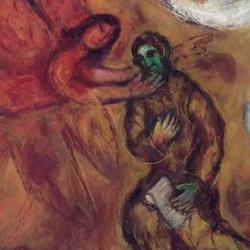Like many commentators, Leclerc points out the puns in Isaiah 5:7: Yahweh expected mishpat but found mispach ; tsadaqa but found tse’aqa . But he notes that most commentators miss the connection of this wordplay with the larger context. The problem with the vineyard, after all, is not absolute fruitlessness, but the production of “wild” or “sour” or “stinking” grapes instead of fine grapes.
As he explains, “The point is that they looked like the real thing but upon closer inspection were not desirable at all, ‘stinking’ and ‘odious.’ The paronomasia thus provides the aural counterpart to the visual image of the grapes. Just as grapes and wild grapes may at first look alike to the untrained eye, so, too, mishpat – mispach and tsedaqa – tse’aqa sound alike but are radically different. The deceptive likeness between the good and bad grapes is essential to the parable as it heightens both the vintner’s eager expectation and then his bitter disappointment.”
He concludes that the problem in Judah is not blatant, obvious injustice. On the contrary, “The outward machinery of justice is there.” The problem is that “closer inspection reveals the most rank forms of injustice . . . . judicial and social structures intended to protect the poor have been corrupted and perverted to exploit and oppress them.”
This is crucial for grasping the biblical notion of justice: Injustice can parade itself as justice, deck itself out in the rhetoric of fairness and equity, but in actual effect grind the faces of the poor.










